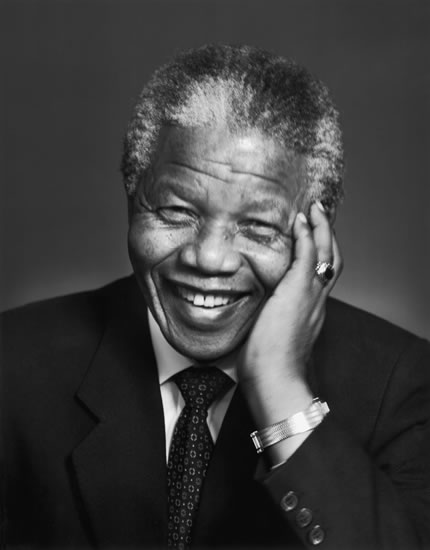
Nelson Mandela, was the South African activist who helped bring an end to apartheid in his nation. He was an advocate for human rights and a global symbol of reconciliation between enemies. His passion and perseverance, despite oppression, show what can be done to overcome impossible odds to change the world.
Mandela was born into a royal family of the Thembu tribe. His birth name was “Rolihlahla,” colloquially meaning “troublemaker.”
In his youngest years, the family lived in the tiny village of Qunu. There were no roads, only foot paths. They lived in huts and ate maize, sorghum, pumpkin, and beans. Water came from springs and streams and cooking was done outdoors.
When Mandela was nine years old, his father died. He left the village he loved, to move to the provincial capital of Thembuland, where he was adopted by a regent. Elder chiefs periodically came to the palace on official business. From them Mandela learned how the African people used to live as brothers. Their relative peace was shattered when the white men came. Black men shared their land, air and water with white people, yet white men took it all to themselves.
During apartheid years, black and white South Africans lived worlds apart. The denial of voting rights, the segregated suburbs, beaches and movie theatres. Whites and blacks sang different national anthems. They celebrated different holidays. Had different flags.
When Mandela was sixteen he learned that because his own people’s land was controlled by white men, they would never have the power to govern themselves. This knowledge eventually formulated his resolve for an independent South Africa.
Can you imagine, having your nation taken over by outsiders who look down on you, even despising you? Can you imagine them taking for themselves what was rightly yours—what had always been yours, while you are left serve them? Can you see how passionately Mandela must have felt about his fight for justice?
And yet, in later years, Mandela was to say, “No one is born hating another person because of the color of his skin, or his background, or his religion. People must learn to hate, and if they can learn to hate, they can be taught to love, for love comes more naturally to the human heart than its opposite.”
In the same way, I think that we are not born to despise people with mental health problems. What is it that makes us learn to hate? The young don’t hate us. What makes them do so as they get older? If those who despise us could only learn to turn back and rediscover the innocent heart of their child inside.
To that, Mandela says, “Education is the most powerful weapon which you can use to change the world.”
The rest of Mandela’s story comes in the next two posts. You’ll read how, despite 27 years of imprisonment, he persevered to bring racial peace and reconciliation to his deeply wounded nation.
This has been Part 12 of the series, The Voice of One Calling. Read Part 13 Nelson Mandela cont’d.
Leave a Reply